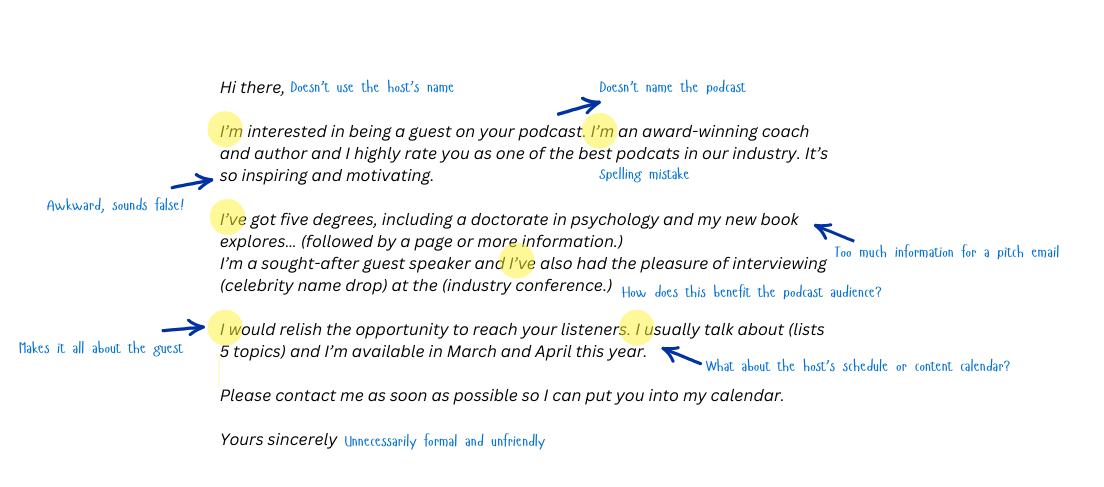The fastest way to write a personalised podcast guest pitch is using this ChatGPT tool we created at Rephonic.
There’s a podcast…or two…or five that you want to be a guest on.
You’ve researched each podcast and listened to a recent episode. You like the show’s vibe. But you’ve spotted a few gaps—and you’re the perfect guest to fill them.
This article uncovers exactly what it takes to write a winning podcast pitch.
Jump straight to the guest pitch template here.Table of Contents
Don’t do this!
First up, let’s look at a ‘bad’ pitch—a composite of howlers we’ve seen and heard about. This one’s full of common mistakes that you REALLY don’t want showing up in your emails.

Podcast hosts have a few vital questions top of mind when they’re considering guests:
- What’s this person like?
- Are they a good fit for the show?
- Do they add value for our listeners?
- Can they have an engaging conversation?
- Will we get along well?
- How easy will it be to work with them?
Does the above pitch answer any podcast host questions? No, it doesn’t. Even if they bothered to open it, that email’s headed for the trash.
How to create a winning podcast pitch

Podcast hosts are busy people and your pitch may well be one of many flooding into their inbox.
Do yourself and them a favor, and keep your pitch brief—200 words max. (Keep that in mind as we go through these tips.). Let’s go through eight proven tips, along with an example—just 183 words long—to create a personable pitch.
#1. Introduce yourself
The host probably won’t recognize your name, so let them know who you are and what you do.
Be friendly, and genuine.
In a few words explain why you’re the right person to discuss these topics with them and their podcast audience. You might include a sentence or two about your expertise, or the project you’re working on, but only if it’s relevant.
Imagine you’re a business coach focused on entrepreneur well-being. You could introduce yourself like this:
#2. Pitch unique talking points
How will you add value to the podcast? That’s likely the host’s number one consideration.
They won’t be interested in a topic they’ve already covered, so don’t go there unless you’re offering fresh ideas or a revolutionary solution. Instead, offer three unique talking points and boil them down to succinct bullet points.
What specific problems does their audience have that you can help solve?
Keeping to our well-being theme, your pitch might focus on the problem of burnout.
- Recognizing burnout signs early (in yourself and your team)
- Balancing work and life during high-pressure phases
- Why sustainable growth and team well-being go hand in hand
#3. Reference previous content

Show you’ve done your homework and genuinely listened to the podcast.
You might:
- Mention a moment that stood out to you in a previous episode
- Offer your perspective on the guest’s remarks
- Refer to a comment a listener left on YouTube or Apple
Be authentic, and really do your homework.
If you send an email saying I’m a big fan of the show, or I loved a particular episode, you’d better believe they'll want to know which episode and why you liked it.
I just listened to your episode with Joe Bloggs – loved how you tackled the tough balance between work and mental health! As someone who’s seen firsthand how important this is for entrepreneurs, I'm eager to build on this conversation with you.
#4. Attach a one-sheet
You’ve probably got loads of relevant information you’d love to share with the host, but there’s no way you can fit it into a 200-word email.
Don’t even try.
Attach a one-sheet instead.
Think of your pitch email as an introduction — a taster. Personalize the heck out of it to catch the host’s attention. If they’re interested, they'll open the one-sheet to learn more.
That’s where they’ll find info on your background, achievements and past guest appearances as well as links to your website, social channels and any relevant stats.
Thanks for your consideration, Dan!
Best,
Matt
(P.S. Here’s some more info about me if you’re interested)
#5. Use the host’s name
I know. It seems obvious. But you’d be amazed how many guests don’t pitch their emails to an actual person.
- Dear podcast host
- Hey there
- To whom it may concern
- Hello team
Podcast hosts loathe generic pitches and starting your email with any of the above sets their alarm bells ringing.
Podcasts are all about relationships, authenticity and connection. So make that your guiding light throughout the whole process, from your initial outreach right through to the recording and beyond.
#6. Tailor your subject line
Your subject line is the first thing a host sees in their inbox. They’ll decide whether to open your pitch or not, based on that short sentence.
So, make your subject line feel personal and relevant to the host. Something like this:
Why does it work?
First, we’ve used the host’s name so it immediately feels personal (and proves we know who we’re talking to.)
Second, we’ve mentioned a unique talking point tied to the overall theme of the show.
Use this simple “personal+relevant” formula, and you’ll be way ahead of most other guests pitching the same show.
#7. Use the right contact info

Again, it seems obvious! But, there’s no point in spending all this time writing your pitch if it doesn’t get to the right person in the right way.
So, double-check (or even triple-check) your information.
The podcast’s website may have some guidance on how they like guests to pitch them. For example, they may have an online form to fill in, or ask you to DM them on a particular social media platform.
If not, then email is the best way to pitch. You might find the correct email address on their website, or you can get the contact info on Rephonic.
#8. Follow up
Just because a host hasn’t answered your email doesn’t mean they’re not interested. They may have forgotten to reply or maybe missed seeing it altogether.
If you pitched via email and haven’t heard back within a week, get in touch again and refer to your previous email. Forward it to them and say you’re still keen on being a guest.
If you filled out an online form, they may have said they’ll get back to you within a specific timeframe. In that case, only follow up with them after that time has passed.
Use this template as your guide
Hey Dan!
I just listened to your episode with Joe Bloggs – loved how you tackled the tough balance between work and mental health! As someone who’s seen firsthand how important this is for entrepreneurs, I'm eager to build on this conversation with you.
If you're open to guests, I'd be honored to share some practical tips on avoiding burnout while scaling. I’m a business coach with 10 years in the field, focused on helping entrepreneurs build growth strategies that don’t come at the cost of their well-being. I’ve been fortunate enough to be featured in Forbes, too, which has been a huge boost for spreading this message.
Here’s a snapshot of what we could cover:
- Recognizing burnout signs early (in yourself and your team)
- Balancing work and life during high-pressure phases
- Why sustainable growth and team well-being go hand in hand
If we move forward, I’d be excited to share the episode with my network, who would get a lot out of this conversation too.
Thanks for your consideration, Dan!
Best,
Matt
(P.S. Here’s some more info about me if you’re interested)
Final words
With these tips, you could see your pitch success rates soaring like those of Your Expert Guest, who credit Rephonic with helping them achieve an impressive 70% pitching success rate.
Remember:
- Pitch podcasts whose audience aligns with your message
- Research thoroughly— and listen to several episodes before you start writing an email and
- Check how they like to receive pitches
- Personalize your email for the podcast and its host
- Don’t write a novel—200 words + a one-sheet is plenty
- Proofread your email (twice) before you send it
- Follow up in a week (or after their stated timeline.)
Rephonic is a database of over three million shows with listener numbers, social reach, contact information and loads more stuff.
Check out our free trial to find the right data to help you book more podcast guest spots.


